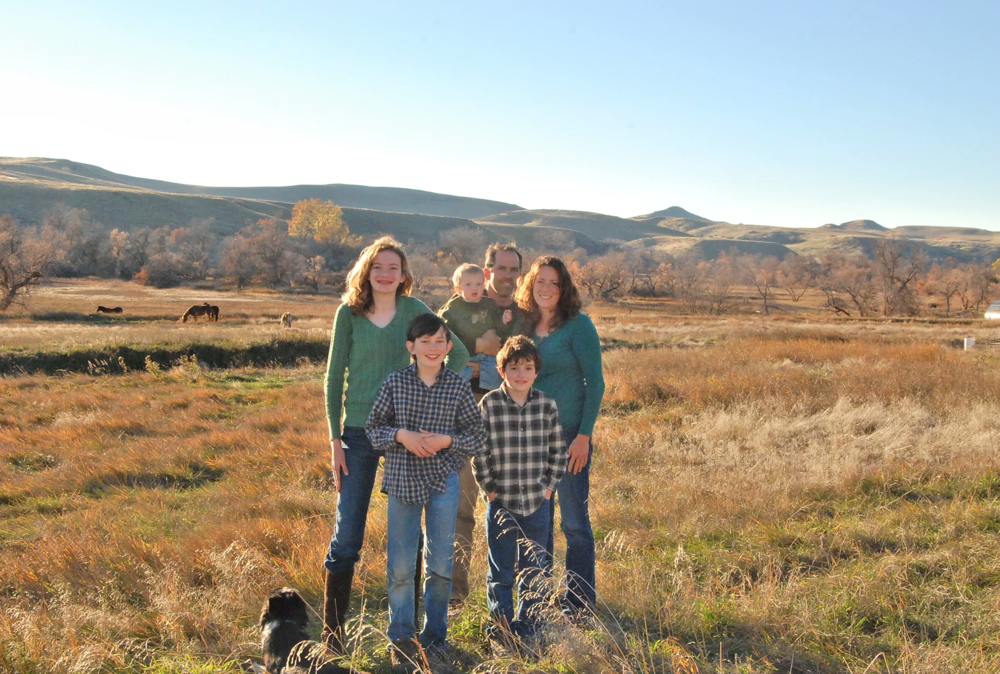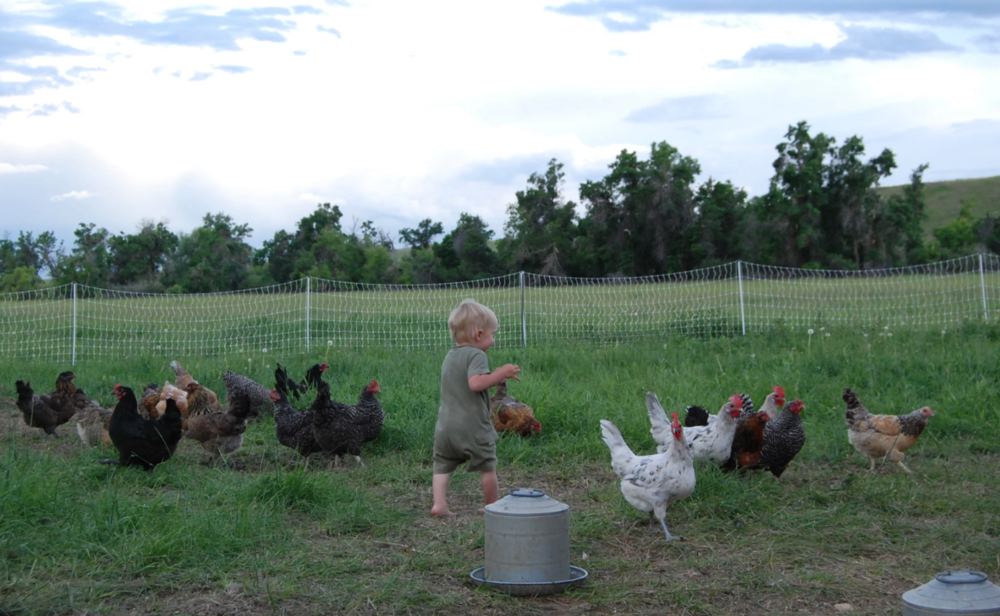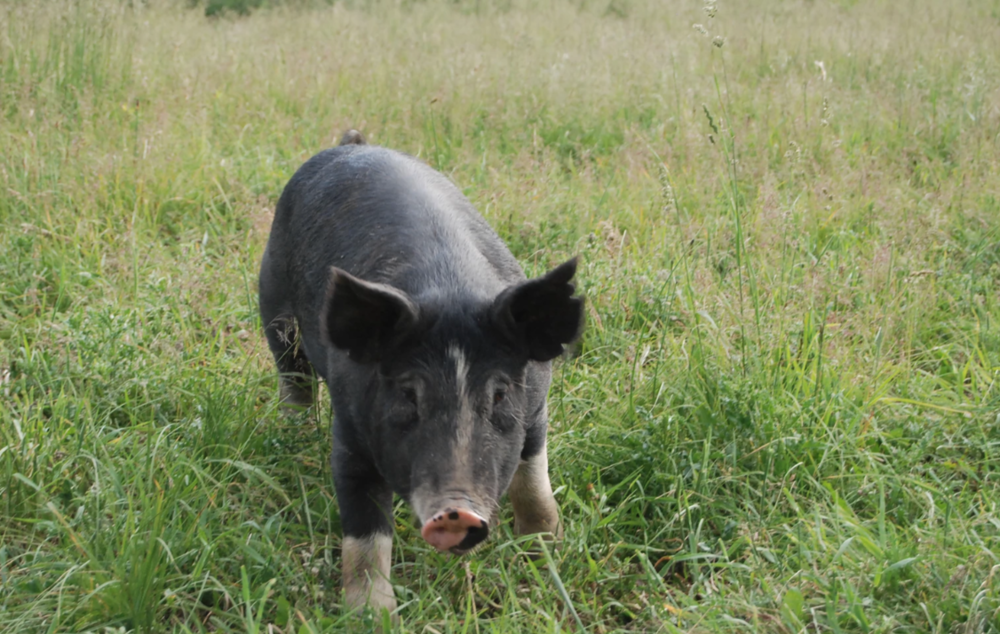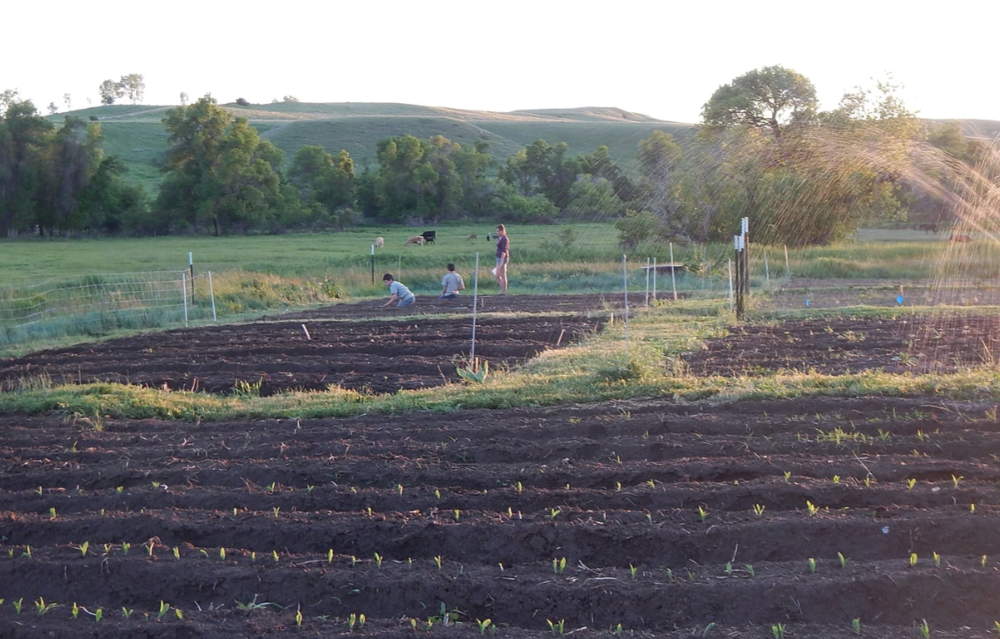
Homegrown Stories is a storytelling project from our partners at Western Organization of Resource Councils (WORC). It celebrates the hardworking people in our food system trying to do things right. The people of these stories are hard at work to create diverse, wholesome, regional food systems in our communities. They feature people working hard to keep the land healthy and their communities nourished.
WORC gave us permission to repost these farmers’ Homegrown Stories here in an effort to change the narrative of agriculture in America.
Theresa and Chris Shaw: Farming for the Community

Theresa Shaw stands in a greenhouse at Shiloh Valley Family Farm as dark storm clouds fill the sky. Her youngest son, 5-year-old David, hangs on her hip as she begins her story.
“The Farmer Veteran Coalition provided us a grant to buy this greenhouse as we were expanding into vegetables,” said Theresa. The Coalition educates and gives grants to veterans who are making a transition from active duty military to farming. “Neither my husband nor I were combat veterans but farming is healing.”
The Farmer Veteran Coalition provides a much needed service Theresa says. “The Farmer Veteran Coalition is vital because many of our veterans are in distress. Farming can be a very healing activity but it also has an incredibly steep learning curve and financial investment. The Coalition provides educational, as well as grant opportunities to assist veterans in the sometimes difficult transition to civilian life.”
Theresa grew up on a conventional farm in Miles City in southeastern Montana. She went into the Reserve Officers’ Training Corps at Montana State University where she met her husband, Chris Shaw. Both Theresa and Chris served in the Air Force. Theresa served as a Special Agent with the Air Force Office of Special Investigations for five years. Chris served as a Civil Engineering Officer for nine. “When my husband and I got out of the Air Force we knew we wanted to farm and we ended up in Sheridan,” she said.
Theresa and Chris run Shiloh Valley Family Farm with their four children. Chris studies online through Montana State University on the GI Bill. He’s working on a masters in education, while teaching as an adjunct professor at Sheridan College. Theresa runs the farm full time, while homeschooling their children.

The Shaws primarily raise pigs, goats, and lamb as well as produce pastured eggs. Theresa saw a need in Wyoming for good pork. “I knew this being Wyoming, I could get good grass-finished beef, I could get lamb, but when I went to the grocery store, but the selection of pork kind of grossed me out. That’s how we decided to raise our own pastured pork. Later, we went with dairy goats and dairy cows for our own personal consumption, and then we started selling goat meat, and eventually, lamb.”
After a few years of solely raising livestock, the Shaws ventured in to growing fruits and vegetables, due to the interest of their son, Michael, in gardening. They now have a market garden which is Michael’s foray into local food production, and an orchard for fruit. “After being in the Air Force and moving every two or three years, we never had gardens or anything so that’s been a huge learning experience. We just planted our orchard last year and some berry plants. So really, a little bit of everything — and that just goes with our vision of things being sustainable and diversified.”

Every Shaw product is stamped with the “Homegrown by Heroes” label. “The Homegrown by Heroes label is a designation,” Theresa said. “Once you’re a member of the Farmer Veteran Coalition, then you can use that label to advertise that you’re a veteran-owned business.”
Theresa worked with the Powder River Basin Resource Council to bring the Homegrown by Heroes label to Wyoming. The label provides consumers with a choice. “To have that designation of the Homegrown by Heroes, for people to be able to say, ‘yes, I want to support that veteran-owned business,’ I think it’s valuable and I would just encourage any veteran to look into it.”
Livestock labeling in general has become a hot-button issue at the national level. The U.S. Department of Agriculture (USDA) recently began to accept public comments on a rule that allows meat processors to import foreign-raised grass-fed beef, run it through a USDA inspector, and slap a “Product of the USA” label on it. This practice helps slaughter companies undercut market prices, hurting American producers. It also encourages deforestation in Latin American countries, where would-be ranchers clear acres of rainforest to pasture cheap beef bound for a trip north and a “Product of the USA” sticker.
Production practices in the Shaw family are the opposite of the suspicious USDA labeling practices. Shiloh Valley Family Farm reflects the family’s belief in honesty, sustainability and diversity. Although they are not certified organic, the Shaws feed their livestock organically grown grain in addition to their grass-fed diet. The family doesn’t use any pesticides or chemicals on any of their food. Their production values stem from the Shaw’s wanting the best food possible for their own family.
“We started out with wanting to teach our kids where their food comes from, respect for animals, respect for the land and just wanted to feed them really healthy food.” That blossomed into producing sustainable, wholesome food for their entire community.
All of the Shaw children help out on the farm.

“We have four kids. Our youngest is five and our oldest is 18,” Theresa said. The Shaw children have varying interests, but all value wholesome food. “My oldest is going off to college this year and she’s going to be doing something completely different than farming. She’s either studying physics or music and has no desire to farm but says she will always have dairy goats and chickens. It’s something that we all value. I don’t expect any of my children, except for maybe my 15-year-old, to farm as a career, but I think the lessons learned and the values that come from farming will stay with them.”
The Shaws take pride in the food they produce for themselves and for their community. “It’s a privilege to be able to provide food for people,” said Theresa. The Shaws sell their meat and vegetables at Landon’s Greenhouse Market, the Sheridan Farmers Market, local health food store Good Health Market and directly to several customers. “We’ve been very fortunate that people from Jackson and Casper have actually started buying our pork and so we’re expanding outside of our primary market, but Sheridan is where we really focus.”
The sense of community that comes from growing food helps fuel the Shaw operation. “I guess growing up on a farm really formed who I am, and I wanted to recreate that sense of community and family entrepreneurship with my own family and my husband decided that that was a good idea, too,” she said.
Connecting with customers at markets is one of the ways Theresa feels a bond with her community. She considers some of her customers more friends than patrons. “I know my customers, and my customers know me, and that’s just really important that I’m contributing to my community. That money spent with me or with our farm gets recycled in the community — we’re giving the community something that maybe they couldn’t get otherwise.”
The U.S. Senate recently stepped up its support for farmers like the Shaws. Included in the Senate draft of the 2018 Farm Bill is more funding and protection for a program that pays for technical training, business planning, farmland access, and other supports for beginning, military veteran, or socially disadvantaged farmers. The new Farming Opportunities, Training, and Outreach Program combines the Beginning Farmer and Rancher Development Program and the 2501 Program (a program aimed at helping socially disadvantaged farmers) will help lift an entirely new group of farmers. Both of the old programs were threatened with being cut in recent Farm Bill cycles. The Senate bill combined the two, made them permanent, and grants them 50 million dollars in annual funding with an additional 50 million dollars in discretionary spending. A conference committee will work out the two different versions of the Farm Bills passed by the Senate and House of Representatives.




